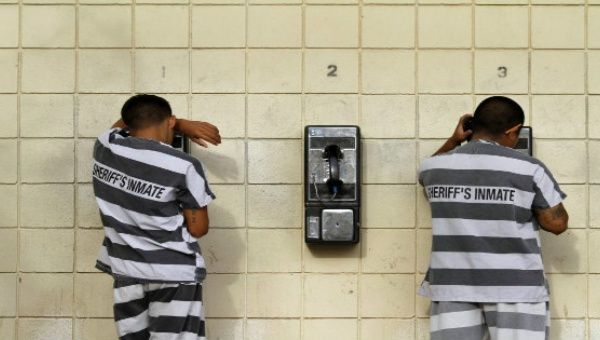loyola llothta
☭☭☭

The Supreme Court will decide if the deportation and detention machinery built by Obama will help Trump's plan to forcibly remove 3 million migrants.
On Wednesday, Obama administration lawyers argued before the U.S. Supreme Court that the court should preserve a key aspect of the immigration detention system which allows for the indefinite detention of migrants without recourse to a legal challenge – preserving a problem of due process for undocumented immigrants which will, no doubt, be highly useful for incoming President Trump's announced plans to forcibly remove millions of immigrants.
RELATED:
'Deporter-In-Chief' Obama Targets Families, Not Felons
In the case, called Jennings vs. Rodriguez, a group of migrants is challenging the constitutionality of the Obama administration's immigration detention policy which sees tens of thousands of migrants jailed daily – and often indefinitely.
“You can’t just lock people up without any finding of dangerousness, without any finding of flight risk, for an indefinite period of time,” said Justice Kagan in her questioning of Obama lawyers. She highlighted that the U.S. Constitution prohibits law enforcement from depriving anyone, including non-citizens, of their liberty without just cause.
Obama’s lawyers argued that their policy is in keeping with laws passed by the Republican-controlled Congress and that those laws trump constitutional guarantees against arbitrary detention. “Congress weighed the interests in controlling the border, protecting the public from criminal aliens, and minimizing the adverse foreign-relations impact of U.S. immigration law,” said Obama lawyers.
The story of the case’s lead plaintiff, Alejandro Rodriguez, shines a spotlight on Obama’s vicious migrant detention policies and practices which are about to be handed over to the proudly racist and xenophobic Trump administration
Rodriguez was brought to the U.S. by his parents at age 1 from Mexico and became a permanent resident at the age of 9. Despite his legal status, he was jailed for more than three years as Obama officials tried to deport him based on two prior convictions for minor offenses. Rodriguez was able to find lawyers to challenge his deportation, and after a 7-year legal battle he won his right to remain.
OPINION:
Obama Builds a Legacy: Deporting Women and Children to Death
The class action suit focuses on the fact that the vast majority of those detained by the Obama administration, especially those without status, are not so “lucky” and that without a guaranteed legal right to a court review of their detention, they are essentially arbitrarily and indefinitely detained.
“This is a class of mostly unrepresented people,” argued the plaintiff’s lawyer, Ahilan Arulanantham from the ACLU of Southern California. “Everybody in the class, in our view, is entitled to an inquiry,” he continued, noting the practical barriers non-citizens especially face in finding legal representation and support.
Access to guaranteed legal representation and hearings are essential, given that those detainees who do get hearings often end up winning their cases, raising questions about the legality of their detentions in the first place. According to the ACLU, nearly two-thirds of asylum seekers detained at the border were eventually granted asylum when they had legal representation. Those facing deportation with the support of legal council won their cases at a rate five times higher than those without it.
Rachel Levenson of the Immigrant Rights Clinic at New York University School of Law points out that detention, by its very nature, makes it more difficult for migrants to fight for their rights. “Detention is punitive, it’s a way of pushing people to cede their cases,” she said. “They’re placed in conditions where (fighting to stay) doesn’t feel like a real option.” The ACLU points out that 66 percent of non-detained immigrants get legal representation, compared to 14 percent of detainees.
Kevin R. Johnson, Professor of Chicana/o Studies at UC Davis School of Law, highlighted the story of another member of the class action, a torture victim from Ethiopia who sought asylum in the United States. The U.S. government racially profiled him and then justified his detention on the racist assumption that “(t)here is an apparent correlation with all the Somalian Detainee’s (sic) that present (sic) a paradigm of deceit and paralleled ambiguity of events and identity.” Though this man was eventually granted asylum after years of detention, Johnson points out that had he a guaranteed right to a detention hearing early in the process, he could have easily pointed out the arbitrary and unjust nature of his detention given that, among other things, he was not from Somalia.
While a court victory would not mean an end to the deportation and detention machinery, it would provide a small but important victory as Donald Trump prepares to take office in January. According to Rachel Levenson of NYU Law School, “if we do win this case we would at least give people access to the court. It would be a huge protection.”
The court is expected to give its ruling in June of 2017.
Obama Fights to Help Donald Trump Jail Millions of Migrants